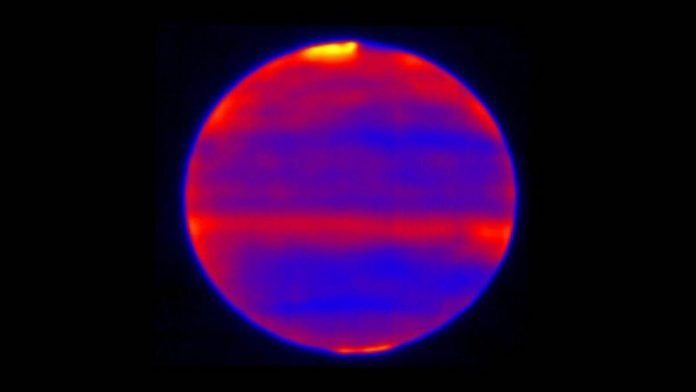
In a new study, researchers found that auroras at Jupiter’s poles are heating the planet’s atmosphere.
The heat has reached a greater depth than previously thought. The team suggests that it is a rapid response to the solar wind.
The study was done by researchers from NASA’s Jet Propulsion Laboratory in Pasadena, California.
The observation was made with a new Earth-based telescope.
The solar wind is a stream of charged particles released from the upper atmosphere of the Sun, called the corona.
Previous research has shown that auroras at Earth’s poles happen when the solar wind interacts with and heat up the gases in the upper atmosphere. The same thing occurs at Jupiter.
In the new study, the team used Cooled Mid-Infrared Camera and Spectrograph (COMICS) at the Subaru Telescope on the summit of Mauna Kea, Hawaii.
The telescope’s Cooled Mid-Infrared Camera and Spectrograph (COMICS) produced infrared images sensitive to Jupiter’s stratospheric temperatures.
In the images, areas of the atmosphere that are more yellow and red show the hotter regions.
The team found aurora produce enhanced and variable heating at Jupiter’s poles.
The heating happens when the magnetosphere and the solar wind interact and deposit energy into Jupiter’s atmosphere.
They found that the heating goes two or three times deeper down into its atmosphere than on Earth.
It is into the lower level of Jupiter’s upper atmosphere or stratosphere.
This is the first time the variations in solar wind could be linked to the response in the stratosphere.
The team suggests that the solar wind impact at Jupiter is an extreme example of space weather.
The new finding provides information about how the sun’s constant outpouring of solar wind interacts with planetary environments.
It is very important to understand the nature of how planets and their atmospheres evolve.
The leader of the study is James Sinclair of NASA’s Jet Propulsion Laboratory in Pasadena.
The study is published in Nature Astronomy.
Copyright © 2019 Knowridge Science Report. All rights reserved.



